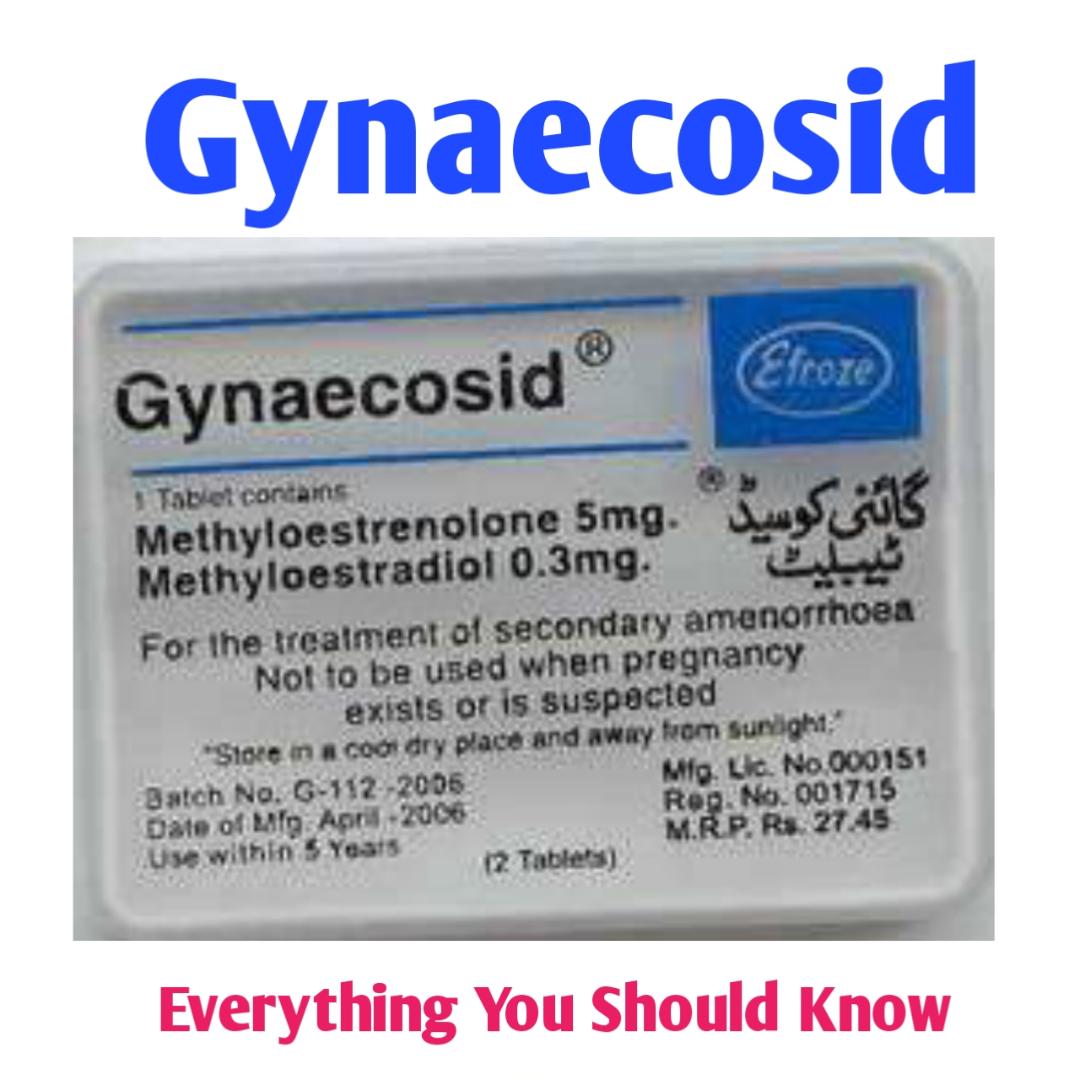What is Gynaecosid?
Gynaecosid® is a prescription medicine used in the treatment of Secondary amenorrhea, menstrual disorders. The therapeutic ingredients are Methyloestrenolone 5mg and Methyloestradiol 0.3mg. Methylestradiol is an estrogen, a group of hormones that are important for sexual and reproductive development, mainly in women. They are also referred to as female sex hormones. The term “estrogen” refers to all of the chemically similar hormones in this group, which are estrone, estradiol (primary in women of reproductive age).
When and How to Use Gynaecosid
Gynaecosid is used for the treatment of Amenorrhea. Amenorrhea is the absence of menstrual bleeding in a woman of reproductive age. It’s normal not to have a period during pregnancy or after menopause. But if you miss periods at other times, it may be a symptom of an underlying medical issue.
There are two main types of amenorrhea. Those who haven’t begun to menstruate by age 16 may have primary amenorrhea. The term also applies to abnormalities in the reproductive tract that prevent menstrual bleeding. If you miss your monthly period for 3 straight months after having regular cycles for the previous 9 months, you may have secondary amenorrhea. This type of amenorrhea is more common.
This pill is specifically for the treatment of secondary amenorrhea, NOT FOR ABORTIONS. Gynaecosid is prescribed after period is missed for two consecutive months where there is no pregnancy. This drug is not a contraceptive or an abortion pill.
Gynaecosid Dosage
1 tab on 2 consecutive days. Menstruation generally occurs 3-6 days later, but in some cases 15 days may elapse before bleeding occurs. For the treatment of non-occurrence of menstrual periods in certain cases (secondary amenorrhea). Delay use for at least 8 weeks after the last menstruation to rule out pregnancy.
Contraindications
Thrombophlebitis, thromboembolic disorders, CVA or history of these conditions; liver disease or history of cholestatic jaundice, pruritus of pregnancy or herpes gestationis; carcinoma of breast or genital organs, suspected estrogen-dependent neoplasia; disturbance of lipometabolism; undiagnosed vag bleeding; hemiplegic migraine; pregnancy.
What happens when a pregnant woman takes Gynaecosid?
Gynaecosid causes a thinning of the lining of the uterus which would result in mild contractions and bleeding but not expulsion of the unborn child or abortion. Severe bleeding may occur if used incorrectly. This drug will not be effective in causing abortions.
Gynaecosid Interactions
Effectiveness may be reduced by certain antibiotics, phenytoin, carbamazepine, barbiturates, rifampicin.
Gynaecosid Side Effects
- Stomach upsets
- Change in appetite
- Headache, migraine
- Abdominal cramps
- Breakthrough bleeding
- Breast, menstrual flow & cervical secretion changes
- Cervical erosion
- Amenorrhea
- Post-treatment anovulation,
- Increase in size of preexisting uterine fibroids
- Depression
- Pruritus
- Allergic rash
- Photosensitivity
- Alopecia and hirsutism
- Chloasma
- Erythema multiforme & nodosum
- Hemorrhagic eruption
- Cholestatic jaundice
- Benign hepatic tumor
Gynaecosid Contraindications
Thrombophlebitis, thromboembolic disorders, CVA or history of these conditions; liver disease or history of cholestatic jaundice, pruritus of pregnancy or herpes gestationis; carcinoma of breast or genital organs, suspected estrogen-dependent neoplasia; disturbance of lipometabolism; undiagnosed vag bleeding; hemiplegic migraine; pregnancy.
8 Science-Backed Home Remedies for Irregular Periods
- Practice yoga.
- Maintain a healthy weight. Changes in your weight can affect your periods.
- Exercise regularly.
- Spice things up with ginger.
- Add some cinnamon.
- Get your daily dose of vitamins.
- Drink apple cider vinegar daily.
- Eat pineapple.
Causes of Missed Period
- You’re pregnant: Even if you are on reliable birth control and have been careful, this should be your first instinct if your period is late or missing entirely. The first three things to check for are pregnancy, pregnancy, pregnancy, this is the number-one thing to look for when you miss your period even if you don’t think you could be
- You got really sick: Serious illness can mess with your cycle because it stresses your body out, and puts too much stress on the part of your brain that regulates hormones.
- You’ve been on the pill for a while: Sometimes, women on pills don’t menstruate monthly or at all,”, it’s completely safe. (Although if you suspect that you could be pregnant, even if you’re on the pill, it’s rare but it happens at the risk of being redundant, take a test).
- You have a tumor: Before you freak out, medical experts say this isn’t as big a deal as it sounds like. But there’s something called a prolactinoma, or a benign tumor that affects the pituitary gland and causes it to secrete too much of the hormone prolactin. These can cause late or missed periods because they also interfere with your ability to generate estrogen—and when estrogen is low, your body has a hard time regulating menstruation, and skips periods.
- Something is off with your thyroid: This gland in your neck regulates your metabolism, produces hormones, controls your body temp, and more. You want it to be on point. When it’s over- or underactive, it may stop ovulation, prompting an irregular period, and possibly impair fertility.
- You’re too into your exercise routine: Hitting the gym even though you’re exhausted from your workout the day before? Or you jokingly say you live at the gym, but it’s actually kinda true? Over-exercising (and eating too little), as well as rapid weight loss or suffering from an eating disorder can all cause your period to disappear, particularly if your BMI drops below 19 or 18.
- You just stopped taking your birth control pill: A hormonal pill can awesomely regulate your cycle, so when you stop taking it, it can be a shock to your body. Usually, might take a couple months before you get your period again. One big thing to remember: You can still get pregnant even without a period you can still ovulate so use condoms anyway if you’re not ready to get pregnant.
- Stress is getting to you: Work has been totally nuts or your class load has you pulling all-nighters. “I describe it to women as whatever stress you’re under, your body decided it was not a good time to get pregnant. It’s your body’s way of protecting you.
- You have PCOS: You’re not getting your period. You’ve got acne, you’re gaining weight despite a healthy lifestyle, and your face and chest are sprouting weird hairs. Your gyno may consider PCOS, aka polycystic ovary syndrome, a hormonal imbalance that keeps the egg from maturing, halting ovulation, and preventing your period.
- You have a pituitary problem: Are your nipples leaking a milky white fluid? Yikes. “It’s rare but I have women come in and tell me they lost their period and have nipple discharge and a headache from time to time,” it might be time for a blood test to check prolactin levels, a hormone that prompts your body to produce breast milk. If levels are high, you may have a benign pituitary tumor called a prolactinoma. Before you freak out, know this: You’d be referred to an endocrinologist, but it’s totally treatable, most often with medication. SEE: What Is Menstrogen






